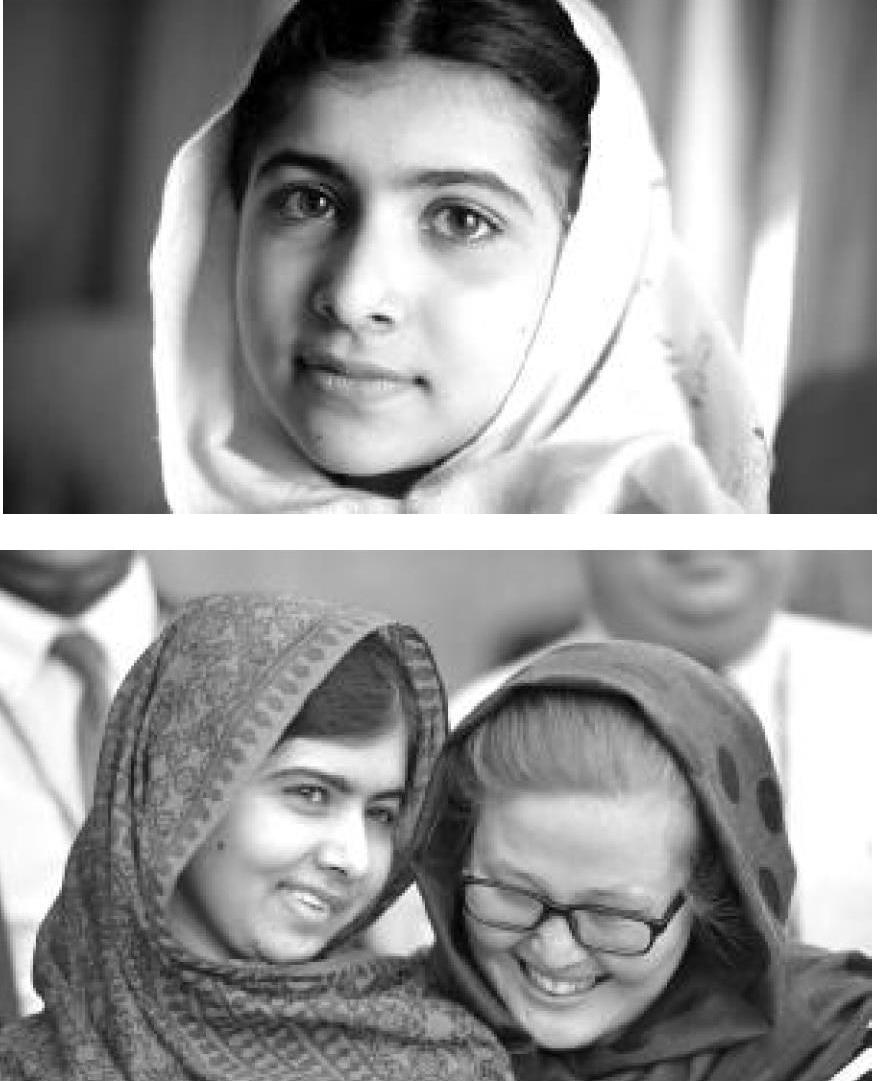我是玛拉拉
2020-08-15



瑪拉拉·尤萨夫扎伊1997年7月出生于巴基斯坦一个普什图族穆斯林家庭,因争取妇女接受教育的权利而闻名。虽然塔利班组织禁止女性接受教育,但是玛拉拉不屈服,不仅继续学业,还通过网络、媒体为巴基斯坦妇女和儿童争取权益。2012年,玛拉拉登上美国《时代》周刊封面,并被该杂志提名为2012年度风云人物。2013年,玛拉拉与女演员安吉丽娜·朱莉合作,致力于为发展中国家的女孩争取受教育的权利,并成立了“玛拉拉基金会”。2013年7月12日,在她16岁生日那天,玛拉拉在联合国发表了遭枪击后的首次公开演讲,第一次公开讲述被塔利班袭击的经过。这个勇敢的巴基斯坦小姑娘还出版了个人回忆录《我是玛拉拉》(I Am Malala)。2013年,她获得欧洲议会颁发的萨哈罗夫奖(表扬奉献己力捍卫人权及思想自由的个人和组织),2014年,玛拉拉与凯拉什·萨蒂亚尔蒂共同获得诺贝尔和平奖,成为诺贝尔奖历史上最年轻的获奖者,2014年10月29日玛拉拉获世界儿童奖。
以上是她取得的一些成就和获得的奖励,而真正让我们为之感动的是她为自己、为他人捍卫应有权利时的勇气。她只是一个普通的女孩子,因受到恐吓而时时担惊受怕,但她从不屈服,反而更加坚强地反抗。人们在她身上看到了奇迹——头部中枪后竟然完全康复。世界不再沉默了,向恐怖分子高声呼喊:我是玛拉拉。
Thorbjoern Jagland (Chairman of the Norwegian Nobel Committee): The Norwegian Nobel Committee has decided that the No…Nobel Peace Prize for 2014 is to be awarded to Kailash Satyarthi and Malala Yousafzai for their struggle against suppression of young people and children and childrens right to education.
Reporter: Out of a valley 7000 miles away, a powerful light.
Malala: We are starving for education. For us its like a precious gift. Its like a diamond.
Reporter: A tiny Pashtu child may be the bravest girl in the world. Malala Yousafzai, who loved her little home and loved her school, when out of the shadows came the Taliban, the radical fundamentalist men, who banned girls schools, bombed them, threw acid at the students. They terrorized the town with corpses in the street, flogging women publicly. But, somehow, Malala never lost her powerful certainty that girls also deserve a full life.
Malala: They cannot stop me. I will get my education if it is in home, school or anyplace.
Reporter: What was the moment you were most afraid, that you had the most fear?
Malala: Like, I was feeling fear all the time. At night, when I used to sleep, I was thinking that “Shall I put a knife under my pillow?”
Reporter: And so, somewhat like Anne Frank, Malala decided to write a diary and send a message to the world, anonymously. And then, at age 11, on camera, online, one of her first interviews calling for help.
Malala: We must have the confidence to say that this thing is going on, and we must raise our voice.
Reporter: The New York Times heard about her and filmed a documentary. Her name was becoming famous inside Pakistan, when the radical Taliban decided her message was so strong they would take her life.
Malala: It was always my desire, before they attacked, that “If a man come [sic], what would you tell him, Malala?” I used to think like that. I will tell that man that “I even want education for your daughter.” Im not speaking...
Reporter: And you think that would work against a gun?
Malala: But I thought that words and books and pens are more powerful than gun.
Reporter: She was on a school bus, like the one children still ride in Pakistan.
Malala: On the day when I was shot, all of my friends faces were covered except mine.
Reporter: Was that wise? It was brave, but was it wise?
Malala: At that time I wanted to live my life as I want.
Reporter: Two men approached. He climbs on the bus and asks the question, “Who is Malala?” She doesnt remember what happened next.
A child gravely wounded. And how she would survive is simply a testament to miracles.
Doctor: The chances of being shot at point blank range in the head and that happening, I dont know, but it is amazing. Truly amazing! I…I dont know why she survived.
Reporter: Miracle?
Doctor: If you believe in miracles, yes, absolutely!
Malala: Maybe. I think death didnt want to kill me, and God was with me, and the people prayed for me.
(in the UN) They thought that the bullet would silence us, but they failed.
Voices: I am Malala. I am Malala!
Malala: (in the UN) Weakness, fear, and hopelessness died. Strength, power and courage was born.
Voices: We are Malala! Malala: ( after receiving the Nobel Prize) They have the right to receive quality education. They have the right not to suffer from child labour, not to suffer from child trafficking. They have the right to live a happy life.
I…I used to say that I think I do not deserve the Nobel Peace Prize. I still believe that. But I believe that it is not only an award for what Ive done, but it is also an encouragement for giving me hope, for giving me the courage to go and continue this campaign, to believe in myself, and to know that Im not alone. There are hundreds and thousands and millions who are supporting me. So, once again, thank you so much to all of you. Thank you.
托爾比约恩·亚格兰(挪威诺贝尔委员会主席):挪威诺贝尔委员会决定将2014年的诺贝尔和平奖授予凯拉什·萨蒂亚尔蒂和玛拉拉·尤萨夫扎伊,以表彰他们致力于帮助受压迫的年轻人和儿童,为儿童争取受教育的权利。
记者:在七千英里之外的一个山谷里,有一盏明灯。
玛拉拉:我们渴望受教育。对我们来说,那就像是一份极其珍贵的礼物,如同钻石。
记者:这个弱小的普什图族孩子也许是世上最勇敢的女孩。玛拉拉·尤萨夫扎伊爱她那小小的家,爱她的学校。塔利班组织开始公开行动,这些激进的原教旨主义者禁止女孩上学,炸毁学校,向学生泼洒强酸。他们把尸 体扔在小镇街上,以此威吓群众,还公然鞭打妇女。然而,不管多么艰难,玛拉拉始终坚信女孩同样应该拥有完整的人生。
玛拉拉:他们阻止不了我。不管是在家、在学校还是在其他任何地方,我都要学习。
记者:你什么时候感到最害怕、最恐惧?
玛拉拉:嗯,我以前常常感到恐惧。晚上睡觉时我常想:“我要不要在枕头下放一把刀?”
记者:因此,就像安妮·法兰克,玛拉拉决定写日记,并以匿名的方式向世人传达一个信息。不久,在11岁时,她出现在镜头前、网络上,在最初的一次采访中向人们寻求帮助。
玛拉拉:我们必须自信地说出正在发生的事情,我们必须大声说出来。
记者:《纽约时报》听闻她的故事后为她拍了一部记录片。她在巴基斯坦成名了,激进的塔利班组织认为她传递的信息过于强烈,打算要她的命。
玛拉拉:在他们袭击我之前,我总是在想:“如果有人来袭击你,你会跟他说什么,玛拉拉?”我以前常常这样想。我会跟他说:“我甚至希望让你的女儿受教育。”我不是在说……
记者:你觉得在枪口下,这话管用吗?
玛拉拉:但我认为文字、书本和笔比枪更有力量。
记者:那天她在一辆校车上,如今巴基斯坦的孩子仍然乘坐这样的车。
玛拉拉:在我被枪击那天,除了我,我所有朋友都把脸蒙上了。
记者:这样做明智吗?你很勇敢,但这样明智吗?
玛拉拉:那时候,我想过我想要的生活。
记者:来了两个男人,其中一个爬上校车,问:“谁是玛拉拉?”接下来发生的事情她已经记不起来了。
这个孩子严重受伤,她能活下来绝对说明了世上是有奇迹的。
医生:头部被近距离枪射而能活下来的机率……我不知道,但这太让人吃惊了。真的不可思议!我……我不知道她是怎样活下来的。
记者:是奇迹吗?
医生:如果你相信有奇迹的话,是的,这绝对是奇迹!
玛拉拉:也许是吧,我觉得死神还不想带走我,上帝与我同在,人们为我祈祷。
(在联合国演讲)他们认为子弹会让我们沉默,但他们失败了。
声音:我是玛拉拉,我是玛拉拉!
瑪拉拉:(在联合国演讲)死去的是懦弱、恐惧和无望;新生的是力量、权力和勇气。
声音:我们是玛拉拉!玛拉拉:(获诺贝尔奖后的演讲)他们有权接受良好的教育,他们有权免受当童工之苦,不再被贩卖,他们有权快乐地生活。
我……我曾说过自己不配得诺贝尔和平奖,我现在还是这样认为。但我相信这不仅是对我所做的事情的奖励,这还是一个鼓励,给我希望、给我勇气继续进行这场斗争,让我相信自己,让我知道我不是一个人,还有千千万万的人在支持我。因此,再一次衷心感谢所有人,谢谢。
